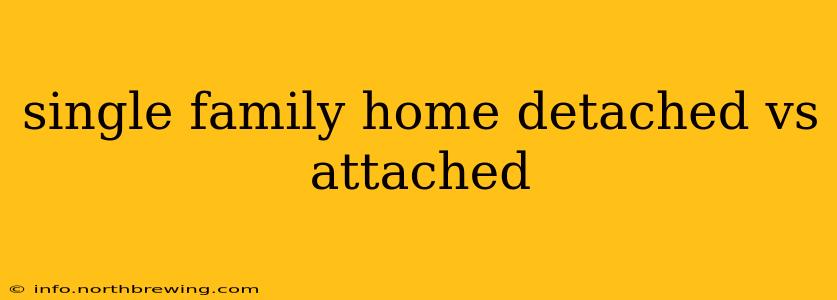Choosing the right home is a significant decision, and understanding the differences between detached and attached single-family homes is crucial. Both offer the benefits of single-family living, but their characteristics, costs, and lifestyle implications differ significantly. This guide will delve into the key distinctions to help you make an informed choice.
What is a Detached Single-Family Home?
A detached single-family home stands alone on its own lot, without sharing walls or structures with any other dwelling. This offers maximum privacy and independence. Think of the classic suburban house—it's a detached single-family home.
What is an Attached Single-Family Home?
An attached single-family home shares one or more walls with neighboring units. This typically includes townhouses, row houses, and some duplexes or semi-detached homes. While still considered single-family dwellings (meaning they are individually owned), they lack the complete seclusion of a detached home.
Detached vs. Attached: Key Differences
Here's a breakdown of the critical distinctions between detached and attached single-family homes:
Privacy:
- Detached: Offers the highest level of privacy. You have your own yard, and your neighbors are at a distance.
- Attached: Privacy can be compromised, depending on the design and proximity of neighboring units. Shared walls can lead to noise transfer and less outdoor space.
Maintenance & Costs:
- Detached: You are solely responsible for maintaining the entire property, including the exterior. This can be more costly but also offers greater control. Costs typically include lawn care, exterior painting, roof repairs, and siding maintenance.
- Attached: Maintenance responsibilities are often shared (HOA fees might cover some exterior maintenance), lessening the individual burden but potentially limiting your control over repairs and aesthetics. Costs typically include HOA fees and interior maintenance.
Space & Layout:
- Detached: Often provides more space and flexibility in layout, both indoors and outdoors. Larger yards and more customizable floor plans are common.
- Attached: Typically offers less outdoor space and may have less flexibility in terms of layout. However, some attached homes still offer generous living areas.
Cost:
- Detached: Generally more expensive to purchase, due to the larger lot size and lack of shared walls.
- Attached: Usually less expensive to purchase, reflecting the smaller lot size and shared walls.
Community:
- Detached: Can feel more isolated, although this depends on neighborhood layout and community events.
- Attached: Often fosters a stronger sense of community due to closer proximity to neighbors.
Resale Value:
- Detached: Generally holds its value well, particularly in desirable locations.
- Attached: Resale value can vary significantly based on location, condition, and the overall appeal of the community.
What are the pros and cons of a detached single-family home?
Pros:
- Maximum Privacy: Enjoy complete seclusion and quiet.
- More Space: Typically offers larger lots and more interior living space.
- Customization: Greater freedom to personalize your home and landscape.
Cons:
- Higher Cost: More expensive to purchase and maintain.
- More Maintenance: Sole responsibility for all exterior upkeep.
- Less Community: Might feel more isolated than attached homes.
What are the pros and cons of an attached single-family home?
Pros:
- Lower Cost: Typically more affordable to purchase.
- Less Maintenance: Often shared responsibility for some exterior maintenance.
- Stronger Community: Closer proximity to neighbors promotes social interaction.
Cons:
- Less Privacy: Shared walls can lead to noise and less seclusion.
- Less Space: Smaller lots and less interior customization.
- HOA Fees: Often associated with monthly or annual fees.
Which is better for me: Detached or Attached?
The best choice depends on your individual priorities and lifestyle. Consider the following factors:
- Budget: How much can you afford to spend on purchasing and maintaining a home?
- Lifestyle: Do you value privacy and space above all else, or do you prefer a more community-oriented lifestyle?
- Maintenance: Are you comfortable handling all aspects of home maintenance, or do you prefer shared responsibilities?
- Location: Are you willing to compromise on location to get your preferred home type?
Ultimately, careful consideration of these factors will help you decide whether a detached or attached single-family home is the right fit for you. Weigh the pros and cons, explore different neighborhoods, and visit several homes to get a feel for what each type of dwelling offers.
